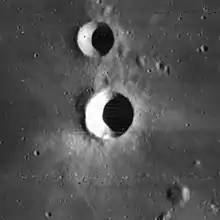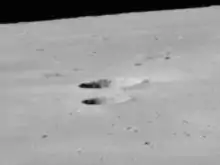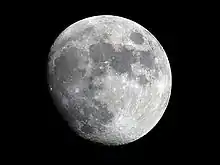Bessarion (crater)
Bessarion is a lunar impact crater located near the southwest edge of Mare Imbrium. It is named after Greek scholar Bessarion.[1] Some distance to the east is the crater T. Mayer. Bessarion is a bowl-shaped crater with a low central rise and a higher albedo than the maria, making it a brighter feature when the sun is overhead.
 Lunar Orbiter 4 image of Bessarion (center) and Bessarion E (top center) | |
| Coordinates | 14.9°N 37.3°W |
|---|---|
| Diameter | 10.2 km |
| Depth | 2.0 km |
| Colongitude | 37° at sunrise |
| Eponym | Bessarion |

Oblique view from Apollo 15
Just to the north of Bessarion is a smaller crater Bessarion E that also has a relatively high albedo. This crater is sometimes called Virgil, although this name is not officially recognized by the IAU.
Satellite craters
By convention these features are identified on lunar maps by placing the letter on the side of the crater midpoint that is closest to Bessarion.
| Bessarion | Latitude | Longitude | Diameter |
|---|---|---|---|
| A | 17.1° N | 39.8° W | 13 km |
| B | 16.8° N | 41.7° W | 12 km |
| C | 16.0° N | 42.6° W | 9 km |
| D | 19.8° N | 41.7° W | 9 km |
| E | 15.4° N | 37.3° W | 8 km |
| G | 14.9° N | 40.3° W | 4 km |
| H | 15.3° N | 41.4° W | 5 km |
| V | 15.0° N | 35.0° W | 3 km |
| W | 16.7° N | 36.9° W | 3 km |
References
- "Bessarion (crater)". Gazetteer of Planetary Nomenclature. USGS Astrogeology Research Program.
- Andersson, L. E.; Whitaker, E. A. (1982). NASA Catalogue of Lunar Nomenclature. NASA RP-1097.
- Bussey, B.; Spudis, P. (2004). The Clementine Atlas of the Moon. New York: Cambridge University Press. ISBN 978-0-521-81528-4.
- Cocks, Elijah E.; Cocks, Josiah C. (1995). Who's Who on the Moon: A Biographical Dictionary of Lunar Nomenclature. Tudor Publishers. ISBN 978-0-936389-27-1.
- McDowell, Jonathan (July 15, 2007). "Lunar Nomenclature". Jonathan's Space Report. Retrieved 2007-10-24.
- Menzel, D. H.; Minnaert, M.; Levin, B.; Dollfus, A.; Bell, B. (1971). "Report on Lunar Nomenclature by the Working Group of Commission 17 of the IAU". Space Science Reviews. 12 (2): 136–186. Bibcode:1971SSRv...12..136M. doi:10.1007/BF00171763.
- Moore, Patrick (2001). On the Moon. Sterling Publishing Co. ISBN 978-0-304-35469-6.
- Price, Fred W. (1988). The Moon Observer's Handbook. Cambridge University Press. ISBN 978-0-521-33500-3.
- Rükl, Antonín (1990). Atlas of the Moon. Kalmbach Books. ISBN 978-0-913135-17-4.
- Webb, Rev. T. W. (1962). Celestial Objects for Common Telescopes (6th revised ed.). Dover. ISBN 978-0-486-20917-3.
- Whitaker, Ewen A. (1999). Mapping and Naming the Moon. Cambridge University Press. ISBN 978-0-521-62248-6.
- Wlasuk, Peter T. (2000). Observing the Moon. Springer. ISBN 978-1-85233-193-1.
| Wikimedia Commons has media related to Bessarion (crater). |
This article is issued from Wikipedia. The text is licensed under Creative Commons - Attribution - Sharealike. Additional terms may apply for the media files.

